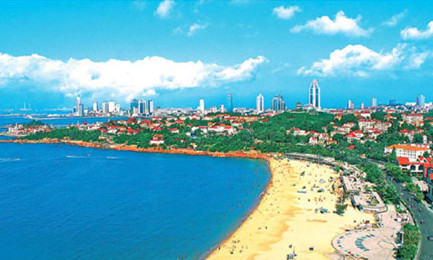A multi-center urban layout, further emphasis on technology and marine industries form base of future development plans.
Qingdao will maintain healthy economic development in the coming five years, with annual GDP growth of about 7.5 percent, according to a top official of the coastal city in East China’s Shandong province.
Meng Fanli, then acting mayor of Qingdao, made the remarks when delivering the government work report at the first session of the city’s 16th People’s Congress opening on April 16.
Meng was elected mayor of Qingdao on April 20, the closing day of the congress session.
The mayor said the city’s goal is to build a livable and innovative international city with steadily increasing resident incomes, a better living environment, growing innovative strength and improved international competitiveness.
He predicted that the per capita incomes of urban and rural residents will double in the forthcoming five years.
According to Meng, the city’s GDP had increased at an average annual rate of 8.9 percent and reached 1 trillion yuan ($145 billion) in 2016.
Residents’ incomes also increased rapidly along with economic growth in the last five years. According to the mayor, the per capita disposable income of urban residents rose by 9.4 percent annually to reach 43,598 yuan in 2016, and the per capita income of rural residents rose by 10.4 percent annually to reach 17,969 yuan.
In his report, Meng highlighted the role of innovation in Qingdao’s development in the next few years.
Driven by innovation, Meng said the city had seen rapid growth in such strategically emerging isectors as the internet-plus and marine industries.
“The emerging industries have played an increasingly important role in driving local growth, especially in upgrading Qingdao’s traditional manufacturing sectors,” said the mayor.
With five major marine innovation platforms relating to deep-ocean engineering, deepocean exploration and marine equipment testing settling in Qingdao, the city has grown into one of the major marine industry cities in the nation and even in the world, Meng said.
According to the mayor, the output value of the marine industries accounted for 25.1 percent of local GDP in 2016, rising 8.3 percentage points from the ratio five years ago.
Wang Fan, head of the Institute of Oceanology, a Chinese Academy of Sciences research facility based in Qingdao, said he agrees with the mayor on the role of marine industries in Qingdao’s growth.
“The innovation-driven marine industries will give a strong boost to Qingdao on its way to becoming a pivotal city in the Belt and Road Initiative,” Wang said.
He suggested that the government give more support to local marine research institutions, helping them to introduce and foster talented professionals and transfer their research results into productivity.










